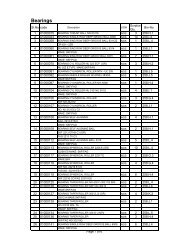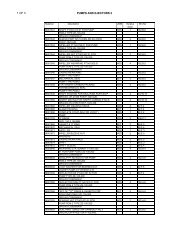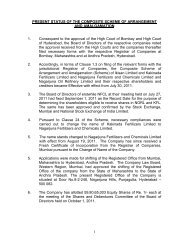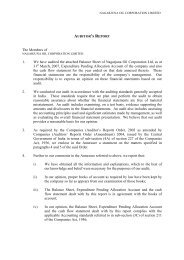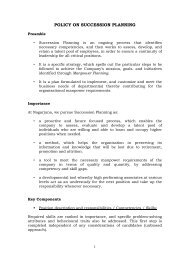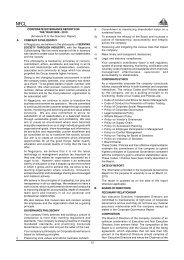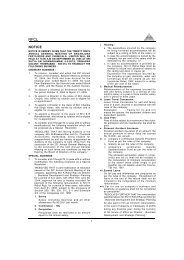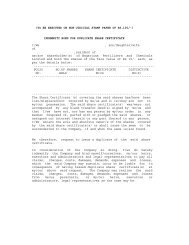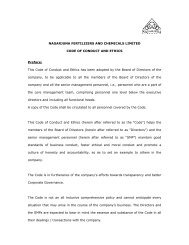Policy on Conflict Management - Nagarjuna Fertilizers
Policy on Conflict Management - Nagarjuna Fertilizers
Policy on Conflict Management - Nagarjuna Fertilizers
You also want an ePaper? Increase the reach of your titles
YUMPU automatically turns print PDFs into web optimized ePapers that Google loves.
<str<strong>on</strong>g>Policy</str<strong>on</strong>g> <strong>on</strong> C<strong>on</strong>flict <strong>Management</strong><br />
Purpose<br />
The purpose of this policy is to help associates of <strong>Nagarjuna</strong> <strong>Fertilizers</strong> and<br />
Chemicals Limited (NFCL) understand the different alternatives available to deal<br />
with c<strong>on</strong>flict in the workplace in a timely, fair and satisfactory way. The goal of the<br />
C<strong>on</strong>flict <strong>Management</strong> System (CMS) is to resolve c<strong>on</strong>flicts at the lowest possible<br />
level using procedures that address and respect the needs, interest and rights of<br />
NFCL associates.<br />
<str<strong>on</strong>g>Policy</str<strong>on</strong>g><br />
A respectful workplace is a right and a resp<strong>on</strong>sibility of all associates at NFCL.<br />
Treating people with civility and respect is an important workplace resp<strong>on</strong>sibility<br />
and all associates are expected to be proactive in handling c<strong>on</strong>flict in the<br />
workplace. To help associates carry out this resp<strong>on</strong>sibility the company provides<br />
safe, fair, efficient and accessible processes, both formal and informal. These<br />
processes will be coordinated through NFCL’s c<strong>on</strong>flict management system.<br />
Associates should not be retaliated against for using this system to try to resolve<br />
problems and c<strong>on</strong>flicts.<br />
Objectives:<br />
To establish a company-wide dispute-handling plan that:<br />
• Provides for the timely and satisfactory resoluti<strong>on</strong> of c<strong>on</strong>flict at the lowest<br />
possible level and in the most cost-effective manner<br />
• Embodies principles of fairness, equity, respect and accessibility<br />
• Decrease the reliance <strong>on</strong> adversarial processes<br />
• Is proactive (not reactive)<br />
• Respect the rights and interests of all stakeholders<br />
• Values c<strong>on</strong>flict as a source of informati<strong>on</strong> and change<br />
Applicability<br />
This policy applies to all the associates of the company.<br />
1
C<strong>on</strong>flict <strong>Management</strong> System Introducti<strong>on</strong><br />
C<strong>on</strong>flict is a normal part of the life of any organizati<strong>on</strong>. This is because members<br />
have different and often opposing views and goals based <strong>on</strong> their own beliefs<br />
and value system. These differences, if well managed, keep the organizati<strong>on</strong><br />
vibrant by stimulating creativity, promoting innovati<strong>on</strong> and bringing about change.<br />
Organizati<strong>on</strong>s devoid of c<strong>on</strong>flict would become apathetic.<br />
While c<strong>on</strong>flict is unavoidable, anger, grudges, hurt and blame do not have to be.<br />
These are the symptoms of badly handled c<strong>on</strong>flict, which can discourage<br />
collaborati<strong>on</strong> and sour working relati<strong>on</strong>ships.<br />
At NFCL we are committed to learn how to avoid the negative side of c<strong>on</strong>flict,<br />
while using the positive side to help ourselves and the organizati<strong>on</strong> grow and<br />
learn. There are two basic things we need to accomplish to achieve the goal of<br />
effective c<strong>on</strong>flict management:<br />
From NFCL: the availability of policies, guidelines and processes to help<br />
associates resolve their problems and c<strong>on</strong>flicts at the lowest possible level in a<br />
safe, fair and efficient manner. This is attained through informal and formal<br />
c<strong>on</strong>flict management processes. These tools will be effectively coordinated<br />
through the c<strong>on</strong>flict management system (CMS).<br />
From associates: a respectful and positive attitude towards others and a<br />
proactive approach towards the handling of c<strong>on</strong>flict in the workplace. Associates<br />
are encouraged to develop the skills necessary to initiate discussi<strong>on</strong>s, listening,<br />
communicating, empathizing, learning, compromising and seeking out resources<br />
to resolve the c<strong>on</strong>flict in a safe, fair and efficient manner. To achieve this, the<br />
company offers the opportunity of skill building through training. These skills and<br />
a respectful attitude in the workplace is c<strong>on</strong>sidered an important part of the<br />
associates’ performance evaluati<strong>on</strong><br />
Basic Communicati<strong>on</strong> rule:<br />
This policy is a commitment to attempt to resolve disputes and problems at the<br />
lowest level possible. As a general rule, people having c<strong>on</strong>flicts or problems<br />
with other(s) have a duty to first try to resolve their issues directly. If direct<br />
communicati<strong>on</strong> fails to resolve the c<strong>on</strong>flict or problem, it is appropriate for them to<br />
request that a supervisor assist in the communicati<strong>on</strong> process.<br />
2
First: Direct communicati<strong>on</strong>:<br />
As a general rule, any<strong>on</strong>e with a problem or c<strong>on</strong>flict with coworker(s) or a<br />
supervisor should first bring it to the attenti<strong>on</strong> of the other(s) and try to resolve it<br />
in a positive manner.<br />
The other pers<strong>on</strong>(s) receiving the request for direct communicati<strong>on</strong> should agree<br />
to meet as so<strong>on</strong> as possible, try to resolve the problem or c<strong>on</strong>flict in a positive<br />
manner and refrain from any type of retaliati<strong>on</strong>.<br />
When direct communicati<strong>on</strong> cannot resolve the problem or when direct<br />
communicati<strong>on</strong> does not hold much promise or can do more harm than good,<br />
parties can request assisted communicati<strong>on</strong> with a comm<strong>on</strong> supervisor or a<br />
mediator.<br />
Then- Assisted Communicati<strong>on</strong>:<br />
When direct communicati<strong>on</strong> between the parties is not successful in resolving the<br />
c<strong>on</strong>flict, the parties can request the assistance of their immediate supervisor. If<br />
the c<strong>on</strong>flict is with their immediate supervisor, the assistance of the next comm<strong>on</strong><br />
supervisory level can be requested.<br />
The supervisor(s) of the parties should meet with them and try to resolve the<br />
issue by helping them find a soluti<strong>on</strong> that is fair and efficient for the problem or<br />
c<strong>on</strong>flict.<br />
If the parties fail to reach a soluti<strong>on</strong> by themselves and even with the assistance<br />
of immediate supervisor, the same need to be escalated to the Head of the<br />
Department (HOD). The decisi<strong>on</strong> of the HOD is final and binding <strong>on</strong> all parties.<br />
Apart from the above set procedure for c<strong>on</strong>flict management, if the<br />
associate is highly aggrieved, he may directly approach the Managing<br />
Director of the company for resolving the c<strong>on</strong>flict.<br />
3



